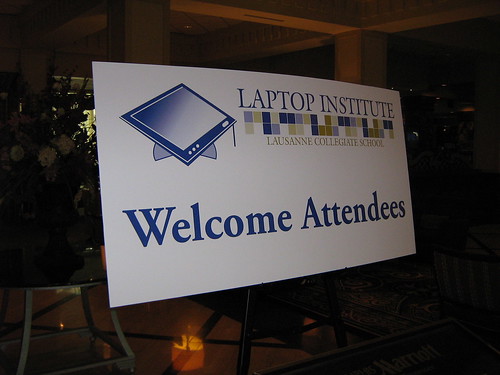It was strange this morning. As an international delegate to Lausanne Collegiate School’s Laptop Institute, I was invited to attend a breakfast at the host hotel for all non-US attendees. Although most of the “international” delegates were Americans teaching overseas, there was certainly an international flavour.
I was at a table with educators curently teaching in International Schools in Poland, the Netherlands, India Switzerland and the Bahamas (a real rough posting!). Besides being geographically closer to the USA than any of these locations, I quickly realized that there was something far more drastic that separated us…they were all from private schools catering to economically advantaged families. Their schools are relatively wealthy, especially compared to local schooling in their areas.
The discussions at the table centered around programs such as IB and AP – programs that most educators in my part of the world havn’t even heard of – and the networking between them and the challenges faced by a somewhat transient student population. They did, however, freely admit that discipline issues faced in our public schools (many had PS experience in the US) did not exist. Student are motivated and excel.
Later, I had a chance to talk to Oanh Vovan, head of French at the American School of Bombay, ojn the bus ride over to Lausanne about her students. While they live in the lap of luxury (weekend trips to ski in Switzerland or shop in Dubai) they live sheltered lives to the poverty that surrounds them in Mumbai. She feels for them, and so do I.
I have often wondered about working internationally. There are obviously possibilities. But I am not sure if I would feel that I would really be doing it for selfish reasons (travel, new experiences) of because I want to make a change. One of my motivators is to see change happen.
I think public schools in North America need good teachers. As the world flattens, maybe the exodus of western teachers will stop, and we’ll start to see a flow the other way. I kind of like that idea. Our kids have a lot to learn about the world, and who better to learn it from than the world.
I am leading two workshops today, one is on On-Line Global Collaborative Projects and the possibilities they offer. I need to think a bit about how International schools fit into that. With their obviously sheltered environment in international settings, can their students really offer a fair view of the world to our students. Or, just maybe, these types of projects can provide both ends with opportunities to learn about their parts of the world.
I like to think it can be the latter.
Technorati tags: laptop2007, laptopinstitute07, laptopinstitute, education, technology, whipple, conference

 Why aren’t we teaching them the skills involved in networking instead. Create learning communities where everyone learns the skills of living in the age when the lines between what is “real” and what is “cyber” become increasingly blurred. Simply put, instead of blocking social networking sites, we need to use these tools to teach our kids about what it means to be a citizen in the digital age.
Why aren’t we teaching them the skills involved in networking instead. Create learning communities where everyone learns the skills of living in the age when the lines between what is “real” and what is “cyber” become increasingly blurred. Simply put, instead of blocking social networking sites, we need to use these tools to teach our kids about what it means to be a citizen in the digital age. Tuesday afternoon and the
Tuesday afternoon and the